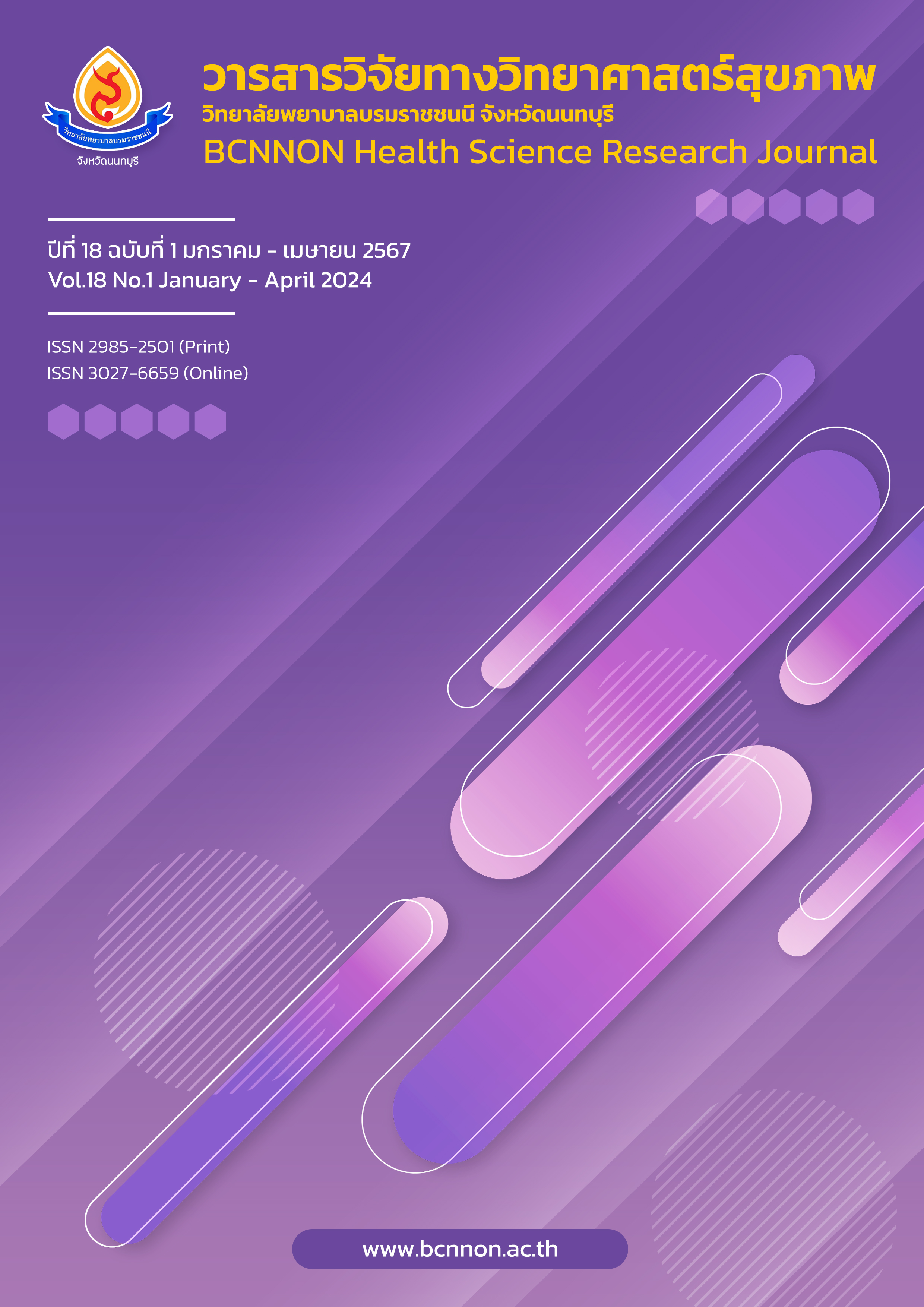Effects of a traditional Thai games program on preschool child development
Main Article Content
Abstract
Background : An early childhood development program is extremely important to stimulate children to develop age-appropriately in terms of movement, social-emotional skills and intelligence, especially a program that uses Thai-style games to help organize play activities.
Objectives : To examine the effects of a traditional Thai games program on promoting early child development.
Methods : This study used a quasi-experimental research with two-group pre-post-test design. The sample consisted of children age 2-4 years who did not pass any item assessed by the Developmental Surveillance and Promotion Manual (DSPM). They were divided into an experimental group and a control group, 30 per group. The experimental group carried out a program using Traditional Thai Games for 4 weeks to promote their development The research instruments included 1) Traditional Thai game program for promoting preschool child development, 2) Early childhood development (DSPM) monitoring and promoting, 3) Video to promote children’s development through traditional Thai games, 4) A guide to promote children’s development through traditional Thai games for parents. Data analysis wre analyzed using descriptive statistics and Chi-square test.
Results: The experimental group improved in every aspect. But in the comparison group, there was only increased development in the large muscles. Small muscles and intelligence and speech perception only By comparing the differences in each aspect of development. Before and after the experiment, it was found that the improvement in self-help and social skills of the experimental group was statistically better than that of the comparison groupat the .05 level.
Conclusions : A program promoting preschool child development via traditional Thai games can promote preschool child development.
Downloads
Article Details

This work is licensed under a Creative Commons Attribution-NonCommercial-NoDerivatives 4.0 International License.
บทความที่ได้รับการตีพิมพ์เป็นลิขสิทธิ์ของวิทยาลัยพยาบาลบรมราชชนนี จังหวัดนนทบุรี
ข้อความที่ปรากฏในบทความแต่ละเรื่องในวารสารวิชาการเล่มนี้เป็นความคิดเห็นส่วนตัวของผู้เขียนแต่ละท่านไม่เกี่ยวข้องกับวิทยาลัยพยาบาลบรมราชชนนี จังหวัดนนทบุรี และคณาจารย์ท่านอื่น ในวิทยาลัยฯ แต่อย่างใด ความรับผิดชอบองค์ประกอบทั้งหมดของบทความแต่ละเรื่องเป็นของผู้เขียนแต่ละท่าน หากมีความผิดพลาดใด ๆ ผู้เขียนแต่ละท่านจะรับผิดชอบบทความของตนเองแต่ผู้เดียว
References
The National Institute of Child Development, Department of Health, Ministry of Public Health. Review and analysis of data on the national early childhood development situation. Nonthaburi: The National Institute of Child Development; 2022. (in Thai).
Health Data Center, Pathumtani Provincial Public Health Office. Percentage of the population aged 35 years and over who were screened for diabetes mellitus Sakon Nakhon province. [internet]. 2022 [cited 2022 Nov 16]; Available from: https://pte.hdc. moph.go.th/hdc/reports/report.php?cat_id=1ed90bc32310b503b7ca9b32af425ae5&id=2238b7879f442749bd1804032119e824. (in Thai).
Ministry of Public Health. Developmental Surveillance and Promotion Manual (DSPM). Nonthaburi: Office of Printing Affairs of the War Veterans Organization 2019. (in Thai).
Suntra N. Summary of results of early childhood development operations for the year 2020. [internet]. 2022 [cited 2022 Nov 16]; Available from: https://nich.anamai.moph.go.th/ th/general-of-50/download/?did=193861&id= 46060&reload=. (in Thai).
Phulom N, Watchasin J, Chaiyamongkol N. Family ecology: factors influencing toddler development. The Journal of Boromarajonani College of Nursing, Nakhonratchasima. 2016;22(1):18-36. (in Thai).
Office of the Secretariat of the Education Council, Ministry of Education. The role of parents, mentors, and child caretakers in raising and developing early childhood children. [internet]. 2022 [cited 2022 Nov 16]; Available from: https://preschool.or.th/content/ documents/1232-file.pdf. (in Thai).
The National Institute of Child Development, Department of Health, Ministry of Public Health. Review of Thai child development status 2021. [internet]. 2022 [cited 2022 Nov 16]; Available from: https://nich.anamai.moph.go.th/ th/general-of-50/download/?did=204370&id =71944&reload=. (in Thai).
Cholchai W. Electronic media through screens and development and learning. In: Cholchai W, editor. Effects of electronic media through screens on children and adolescents. Bangkok: Beyond Enterprise; 2018. (in Thai).
Tipmanosing D. Factors affecting early childhood development of children at the Bangkok Child Development Centers. Journal of Charoenkrung Pracharak Hospital. 2022;18(1):51-68. (in Thai).
Thongluang P. The effects of self-efficacy development program on promoting early childhood development. [Thesis]. Phitsanulok: Naresuan University; 2016. (in Thai).
Lewin K. Frontiers in group dynamics: concept, method and reality in social science; social equilibria and social change. Hum Relat. 1947;1(1):5-41. doi: 10.1177/00187267 4700100103.
Kongdoung P. Effects of sensory motor activities on early childhood development [Thesis]. Chiangmai: Chiangmai University; 2017. (in Thai).
Cohen J. Statistical power analysis for the behavioral sciences. 2nd ed. New Jersey: Lawrence Erlbaum Associates; 1988.
Sirithongthaworn S. The development of developmental surveillance and promotion manual; DSPM. Journal of the Psychiatric Association of Thailand. 2018;63(1):3-12. (in Thai).
Klinkasorn S. Thai games. Bangkok: Chulalongkorn University Press; 2016. (in Thai).
Madteh F. The effect of practicing folk games on the development of early childhood children [Thesis]. Songkhla: Prince of
Songkla University; 2014. (in Thai).
Paso P, Chuwet P. The effects of Isan recreational folk game program on youths’ physical fitness and stress level. Journal of SaengKhomKham Buddhist Studies. 2022;7(1):47-64. (in Thai).
Srituravanich C, Somboon P, Sukkasem Y. The effectiveness of developmental programs for children aged 3-5 years. [internet]. 2019 [cited 2022 Nov 16]; Available from: https://oec. anamai.moph.go.th/th/more-news-php-cid-108-filename-index/download/?did=200518 &id=60444&reload=. (in Thai).
Baradaran Bazaz S, Yaghobi Hasankala Q, Shojaee AA, Unesi Z. The effects of traditional games on preschool children’s social development and emotional intelligence: a two - group, pretest - posttest, randomized, controlled trial. Modern Care Journal. 2018; 15(1):e66605. doi: 10.5812/MODERNC.66605.
Somsri T, Haenjohn J, Supwirapakorn W. A development of inhibitory control based on Thai traditional game training program in elementary school students. Journal of The Royal Thai Army Nurses. 2020; 21(2):222-30. (in Thai).
Niltawee J, Chaleekhrua S. Developing social behavior of pre-school children by using Thai folk plays. Sikkha Journal of Education. 2021;8(1):57-66. (in Thai).


